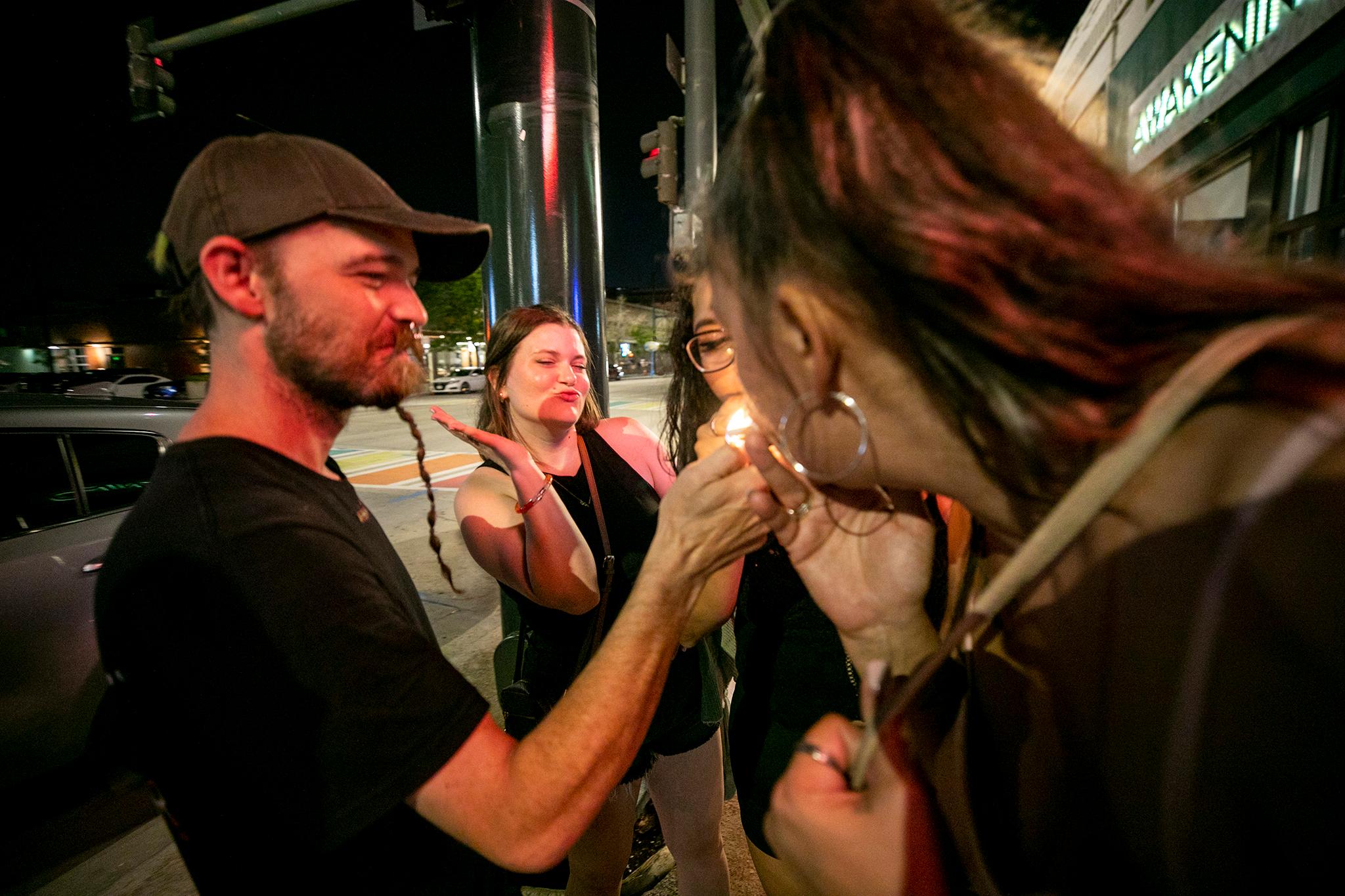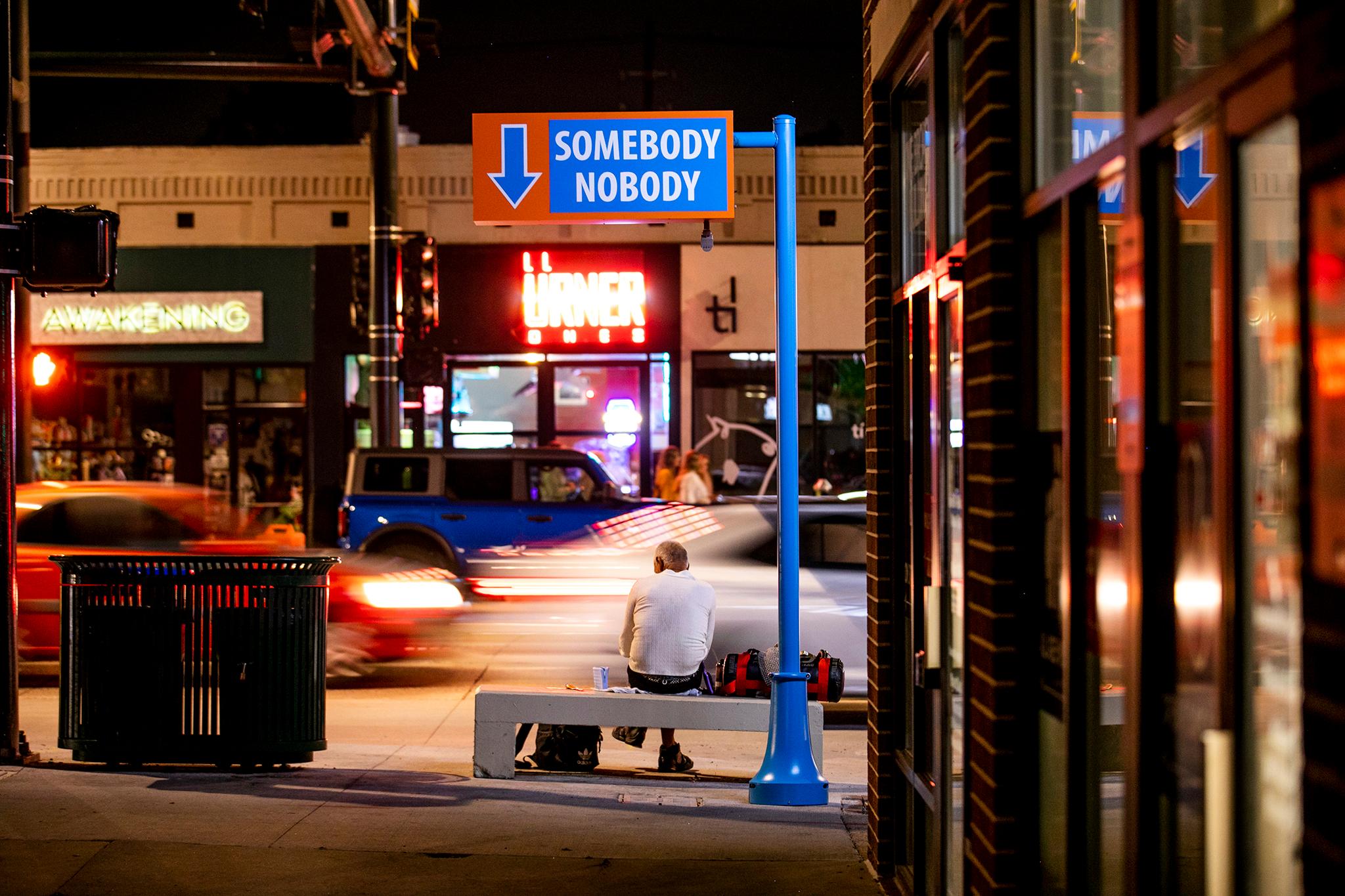On a blistering Wednesday afternoon in August, 27-year-old Leo Hammad, a Denver calzone slinger by day and mixed-martial-arts fighter by night, struts into an alley behind Full Afterburner Calzones east of Broadway where he says people are using drugs.
Several men lean against a wall behind the jet-fighter-themed restaurant, chatting in the shade. Hammad nods at the men, and they nod back. One greets him by name.
"The guy with the dreads is cool," says Hammad, who often hands the man $10 to stop people from slashing his tires, sawing off his catalytic converter or altogether stealing his car.
Hammad lives nearby in a sober living house, where he stays with people in recovery, some of whom lived on the streets. At the height of his drinking and drugging, Hammad was evicted and slept in hotels, though he always knew he could stay with his mother.
When Hammad goes out for his 5 a.m. runs, he says he has to jump over feces and people lying on the sidewalk.
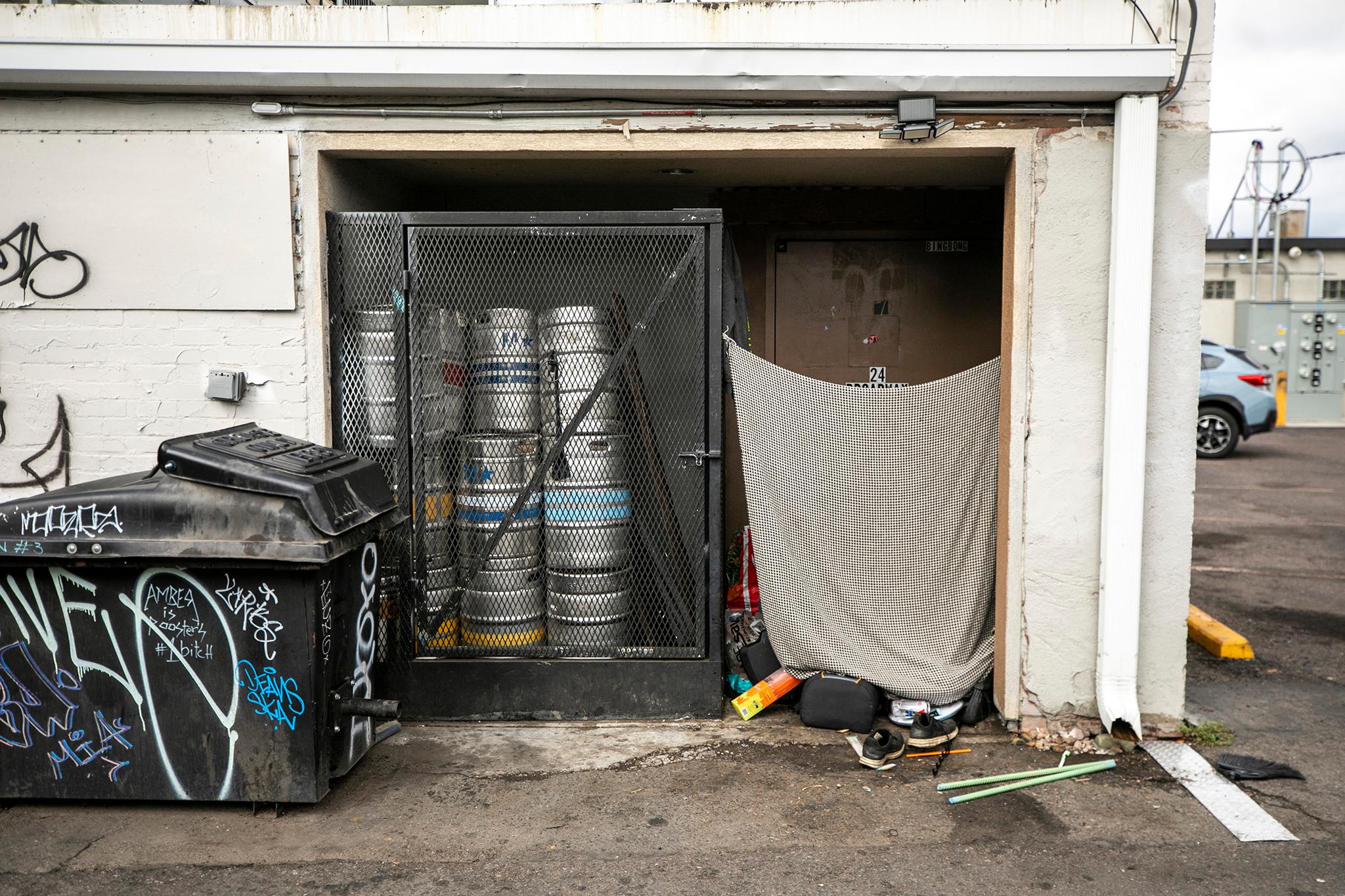
"You see some gnarly stuff," he says. "People sh******themselves, people puking, screaming. They're in full-blown psychosis because the drugs are wearing off. It literally looks like the world's ending."
People have threatened to kill the workers behind the counter. Others have run into the shop and stolen tips, says Hammad pointing to a few dollars in a jar -- gas money to get to work. While he can defend himself, he worries about his coworkers' safety.
With housing costs, homelessness and crime on the rise, the crises Denver faces have spilled onto the sidewalks and alleys and inside small businesses like Full Afterburner Calzones. Employers are trying to keep their businesses open and staff paid and safe, even as they know their own workers can hardly pay for rent and food. People without homes are trying to kindle hope and community, while many Denverites want them gone by any means necessary.
Both those with homes and those without stress about how to stay safe from their neighbors -- when to call the police, when to fight and when to be generous.
"It isn't normal," Hammad says of the dynamic he sees play out in and around the calzone shop.
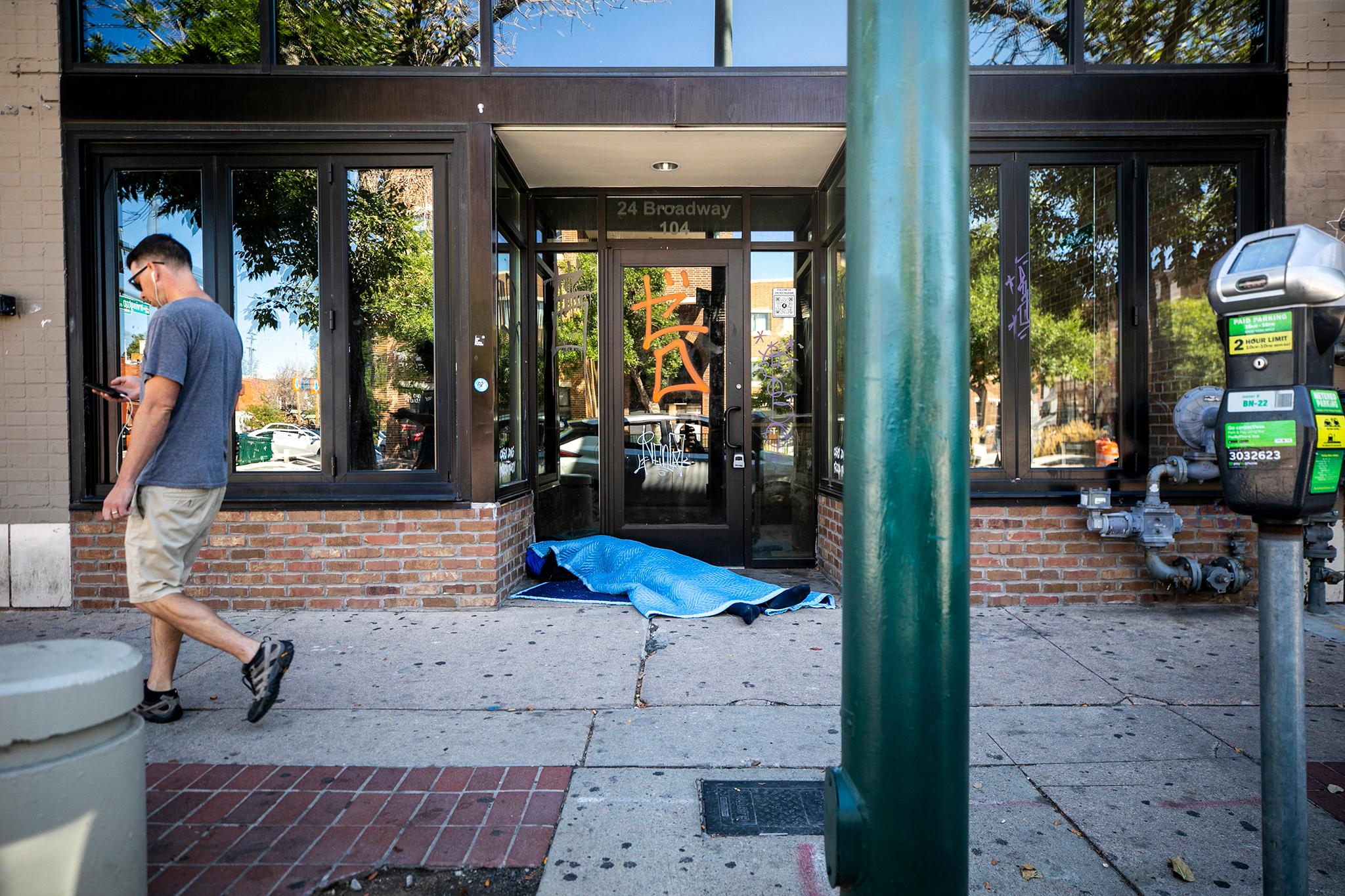
Minutes later, police arrive to talk to the people in the alley. The co-owners of the shop, husband and wife Ben Todd and Hillary Schefter, show up to speak with the officers.
Todd was just at a meeting of Broadway business owners, venting about how homelessness and crime are hurting his restaurant.
"The things we're doing about the homeless -- housing them, treating them, helping the ones who need help -- that's a good thing that needs to be done. We should pay for that" he says. "The street junkies with drugs, I think, just need their a***** kicked with a serious penalty. I'm talking like two years in jail if you're caught with one dose of fentanyl."
Todd says business leaders, police officers and a City Council member -- who vary in their attitudes toward homelessness and drug use -- have cautioned him to tone down his rhetoric.
One business leader said, "You've got to be careful because businesses have been threatened to be canceled if you're angry and an advocate of being anti-homeless or not supporting the homeless or not supporting homeless initiatives," Todd recalls.
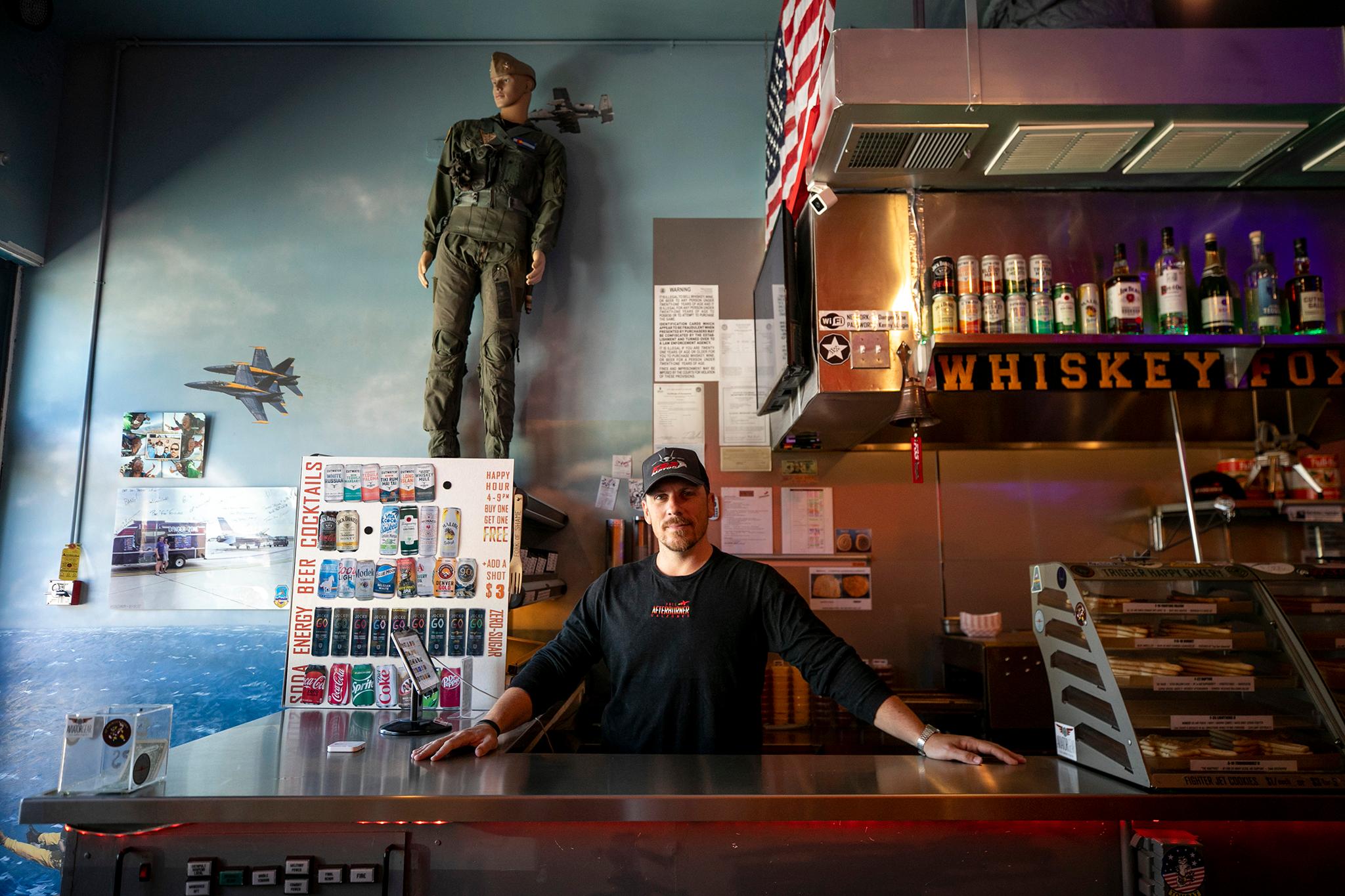
The city hasn't figured out how to solve the crises the people of Denver face.
Homelessness rose in the Denver metro by nearly 32% from 2022 to 2023, with 9,065 living without a home on one night in January, according to the annual Point in Time count.
Crime has also increased, with the sharpest spike being drug crimes, which have risen by more than 48% compared to the three-year average, according to the Denver Police Department's crime database.
And evictions are up. So are home prices and rent, making it harder for workers to find a place to live.
New Mayor Mike Johnston has declared a state of emergency over homelessness and is trying to house 1,000 people by the end of the year and end homelessness within his first term. He's concentrating his efforts on the visibly homeless downtown, and he's been meeting with neighbors across the city to find places to temporarily house people in individual shelters like tiny homes and motel rooms.
A solution can't come fast enough for Todd, who keeps zip ties in his restaurant to detain people and says he's willing to break bones to stop criminals from threatening his workers.
"We're open 'til [3 a.m.] on Friday and Saturday," he says. "You've got to be prepared."
He's only used the zip ties once after an 18-year-old stole tips, threw a brick at the shop and threatened to shoot workers.
Todd chased the person down on his scooter. When he finally caught up with the thief, Todd said, "You're coming with me."
But the 18-year-old, whose pronouns are unclear in the jail database, started running.
The person ran through traffic on Broadway. They lost their shoes and quit running.
"I was able to overpower him," Todd says. "He's like a 100-pound 18 year old, completely unarmed. I'm a rugby player -- kickboxing -- I got a black belt when I was 13. I've trained for a lot of this stuff. Confrontation's kind of my default."
Todd cuffed the person and marched them back to the shop.
"I tried to get him to understand that violence was an option," Todd says. "But it's not what he needed. What he needed was a friend, a mentor, and somebody to set him straight."
Instead of calling the cops, he reached out to the grandmother who had lived with the 18-year-old. When the grandmother came, she and her grandchild fought, so she called 911.
After the police came, "I mentioned to him that if I see him again, anywhere on Broadway, it would be a regretful thing for him," Todd says. "And the police officers were like, 'We appreciate you taking a stand. But at the same time, you know, you've got to let us do our job the way we know how to do it."
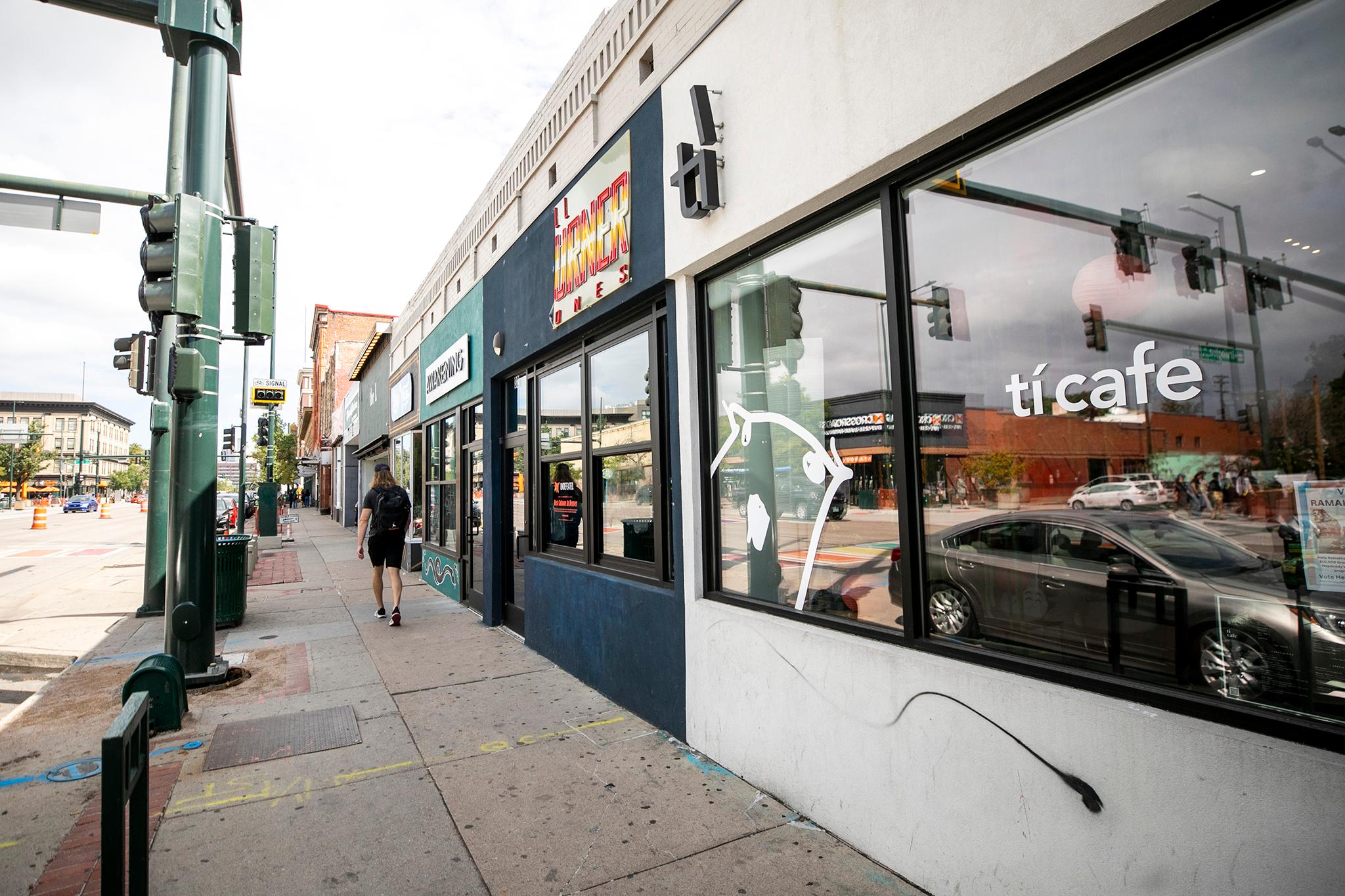
After the 18-year-old was arrested, Todd went to find his scooter, but it had been stolen.
The scooter had a GPS tracker on it, so Todd and his wife drove to where the scooter was. Two men had it. They said they bought it for $40 and would not give it to him. Todd threatened to call the cops, and the guys jumped in a car and drove away.
Todd and his wife sped after them.
"They stop," he says. "I get out, and I'm ready to tear these dudes in half."
The men started running, and Todd started chasing them.
"If I get my hands on this dude, I'm going to break every bone," Todd says. "He won't walk."
One of the men pulled out his gun.
I'm not trying to die over this scooter, Todd thought, so he got back in the car and drove away.
Two days later, he saw the man at Dunkin' Donuts and called the police. When they arrived an hour later, the man was gone.
The cop said, "You can do more than I can," Todd remembers. "If he pulls out a gun, and you feel threatened for your life, you can shoot him."
"Maybe we'll see him again," Todd says. "I hope that when we see him again, he's alone. He's unarmed. And I'm behind him. And I will not be calling the police."
Though he has and is willing to use force to defend his shop and his workers, Todd says, he does not want to be portrayed as a vigilante.
"I would prefer to be characterized as someone who is defending my legal boundaries and caring a great deal about my community, which is overrun by junkies and criminals," he says. "I simply hope it doesn't claim my life, as it has with others."
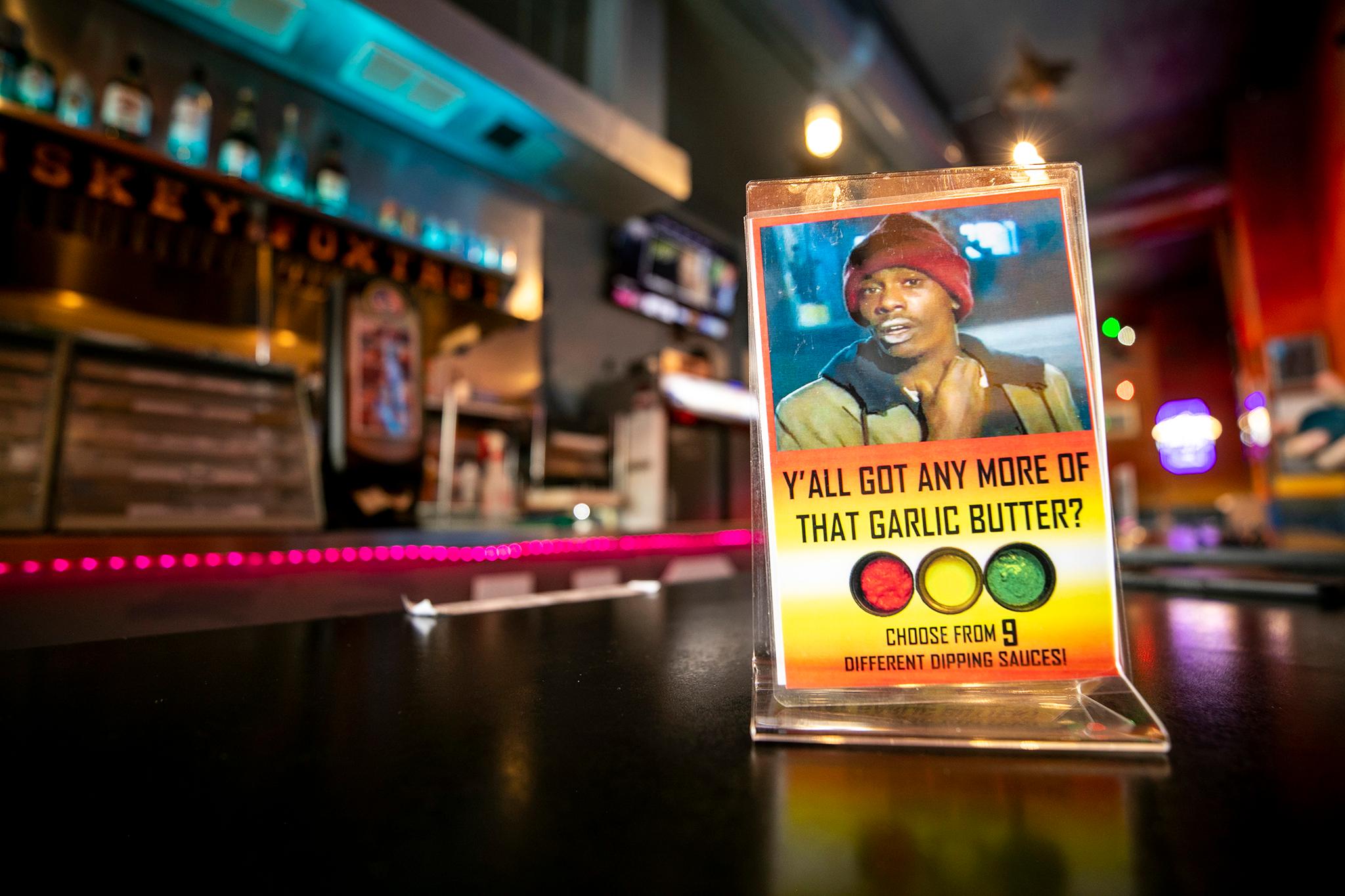
On Saturday morning, Gregory Down sits on a stool in the alley behind the calzone shop, shaded from the sun by a dumpster.
The Air Force veteran who grew up in South Boston in the 1950s stares through his matted hair at his belongings spread in the dirt: A notebook. Blue jeans. A can of soup. A packet of spicy tuna. A half-full bottle of Kentucky Deluxe. A stack of antique greeting cards he found in a shoebox in the trash.
Down's been looking for his cribbed CD player and headphones so he could listen to REO Speedwagon, a group he's seen more than 20 times -- last at Red Rocks more than a decade ago. He's embarrassed by the mess.
Down moved to Denver in 1999 and has been without a home since he was living at the YMCA near the 16th Street Mall around eight years ago. He's lived Downtown, in Civic Center Park, in the Golden Triangle and for seven years -- off and on -- along the Broadway corridor.

A red Subaru cuts through the alley for the fifth time in 45 minutes. He fears it's one of the "gang stalkers," residents who harass unhoused people sleeping outside.
"They're just making us crazy," he says. "If you treat somebody like an animal long enough, you might not be happy when they start acting like one."
He's seen people shoot guns to scare him and his friends. Drivers regularly speed through puddles, splashing people sleeping outside and swerving their cars toward the unhoused.
"These cars will stop at 3 or 4 in the morning, stare at us because they're all nosy," Down says. "You want to avoid that? Go to the end of the alley, find the biggest puddle, take a nice can of long nails, throw them in there."
The goal: Pop the gang stalkers' tires to force them from behind their car wheels and confront them face to face.
"You want to mess with us?" he says. "This is how it's going to look."
We asked Denver Police Department if there are any reports of a red Subaru or others harassing the unhoused. DPD said they had no reports of such trouble but also acknowledged that doesn't mean it's not happening.
Down remembers meeting Todd while camping in a doorway near Full Afterburner Calzones.
Todd handed Down and his friends bottles of water and asked them to leave.
When Todd came out several days later, Down was still there, and Todd told him that was not OK and that if Down wouldn't move on his own, Todd would relocate him, himself.
"What are you going to do? Beat me up?" Down said. "I can get someone to beat you up, too."
"In no way does that worry me, bro, whether you're making it up or not," Down says, recalling the encounter. "'I have friends that I can call from down in the Triangle area who for 10 bucks of crack can crack your f****** jaw.'"
Todd hasn't seen Down in the alley recently.
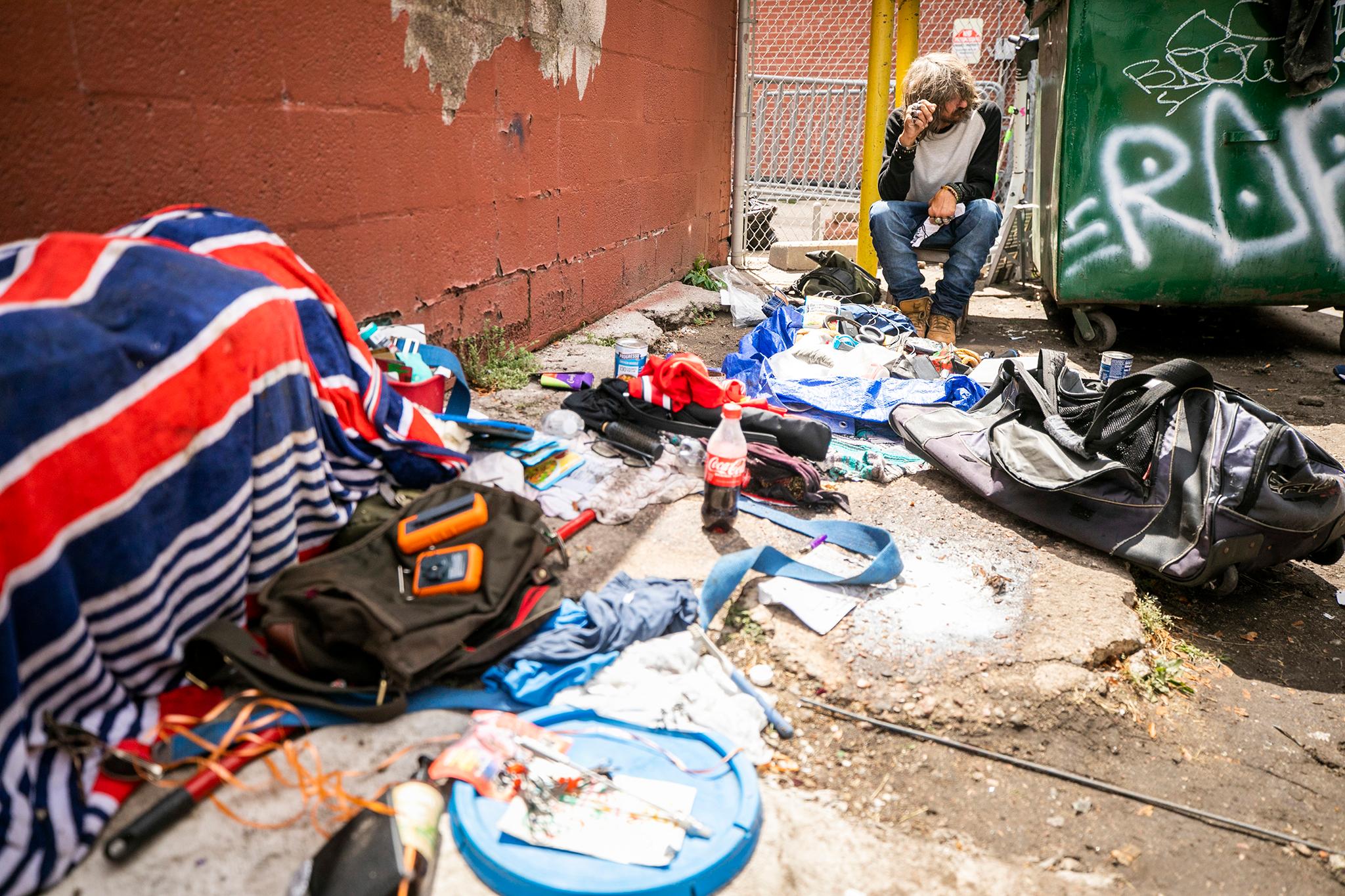
"If I saw Gregory Down today, I'd thank him for moving on without any violence," Todd says. "Every single person in that alley who is not homeless was afraid of him, and perhaps rightfully so. He doesn't really seem to understand why doing drugs in the alley is not a great look, and attracts more junkies. But I'm glad he's gone."
Down says unhoused people are ready to riot over how they're being treated. Some people on the street have served time for arson, and he's heard rumors that one of them has considered burning down the block if things get bad enough. And it wouldn't be that hard to sneak a bed bug or a roach into the restaurant and call the health department.
"If I owned a business around a lot of homeless, I would befriend them," Down says. "I would befriend them because I got raised right. And the more you show people that you're cool and you're alright, the less people wanna hurt your business."
On Friday afternoon, Wayne Wilt takes a shower before another night shift at Full Afterburner Calzones.
His long beard puffs up in the water, and he has to tie it in multiple rubber bands to keep it from frizzing.
The night before, his coworker walked off the job after getting drunk with coworkers, he says. So the 39-year-old restaurant veteran was at the shop closing by himself until 4 a.m. Now he's back to do it all again -- just a little more stressed.
Since Wilt arrived in Denver 15 years ago, he's watched the city change and rents rise faster than wages. To stay housed, "you have to have multiple jobs or be with someone," he says. "I just got out of a 15-year marriage. Just split up. We still live together. We're just splitting bills right now. And that's the only way that we can survive."
He spends most of his income on rent and doesn't have much left for food or fun.
"I eat calzones all the time," he says. "I have to." He's had his fill of the calzones named after Top Gun characters like Goose and Maverick. "That's why I make up the new ones all the time. Our new weekly special is my special, because I'm like, I need to find something else that I want to eat."
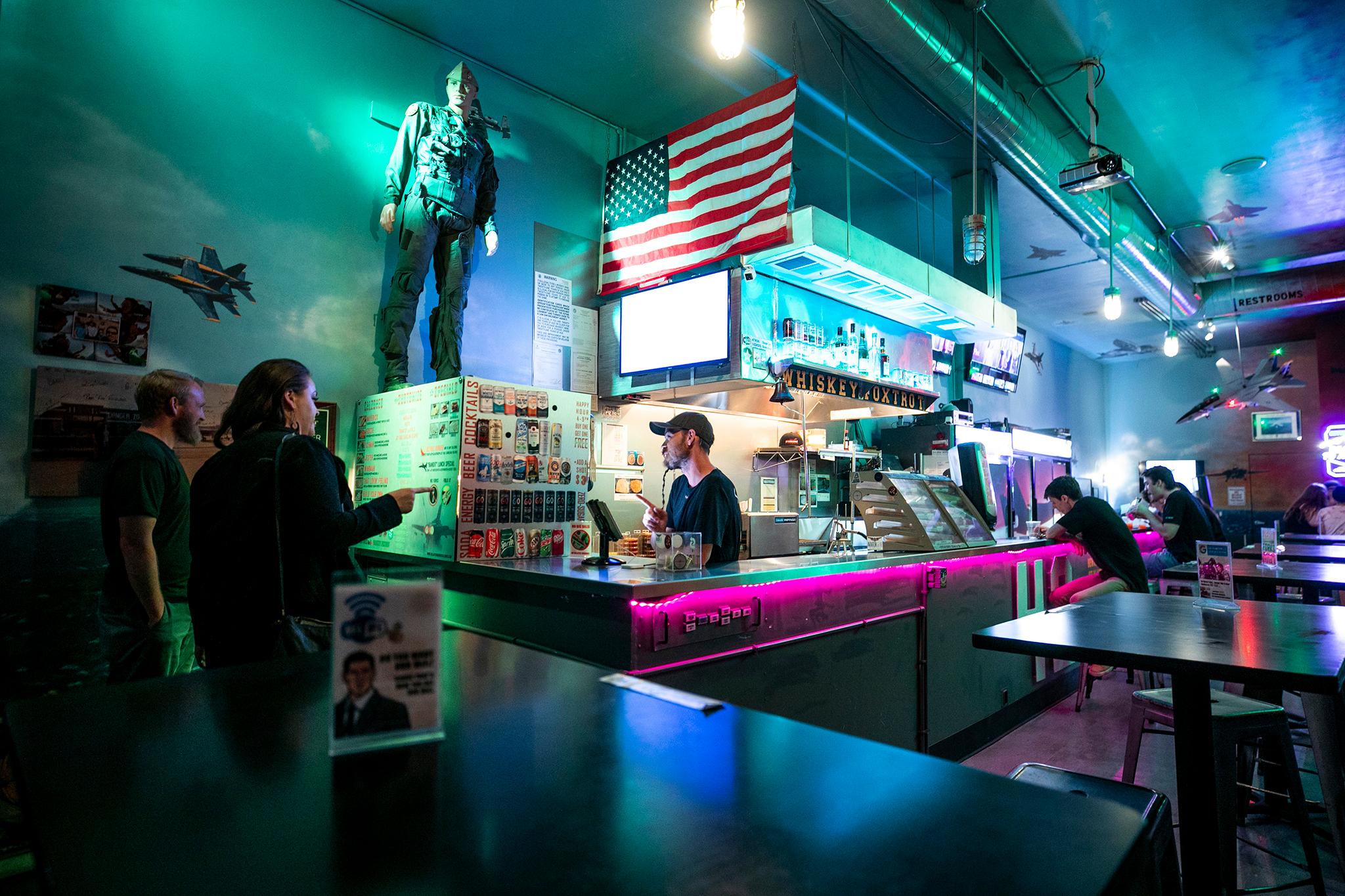
Owner Todd is frustrated by the high cost of living people, including his own employees, face in Denver.
"I don't particularly care for the real estate game in this homeless crisis," he says.
He had tuned in to a recent City Council meeting where representatives from the Department of Housing Stability (HOST) talked to council members about how the rise in housing prices has outpaced the growth of income in Denver.
Since 2013, the median price of a condo has increased nearly 198% from $152,750 to $455,000. Meanwhile, minimum wage has increased by just 122% from $7.78 to $17.29. That trend, according to HOST, has led to an increase in homelessness.
"If it's growing disproportionately to the wages, maybe just stop the housing pricing going up?" he says, even if rent control is a controversial idea and banned at the state level. The state legislature voted down a measure that would've allowed a version of rent control in the last session.
One of his workers lives a block from the shop, he says. "She is paying $1,300 a month for poop on her doorstep, in an apartment building that opens up to an alley where there are actively people shooting up.
"If we're in a free market, how is that place rented?" he asks. "Shouldn't that be the place that no one wants to rent, that is impossible to find tenants for, that costs like $20 bucks a month?"
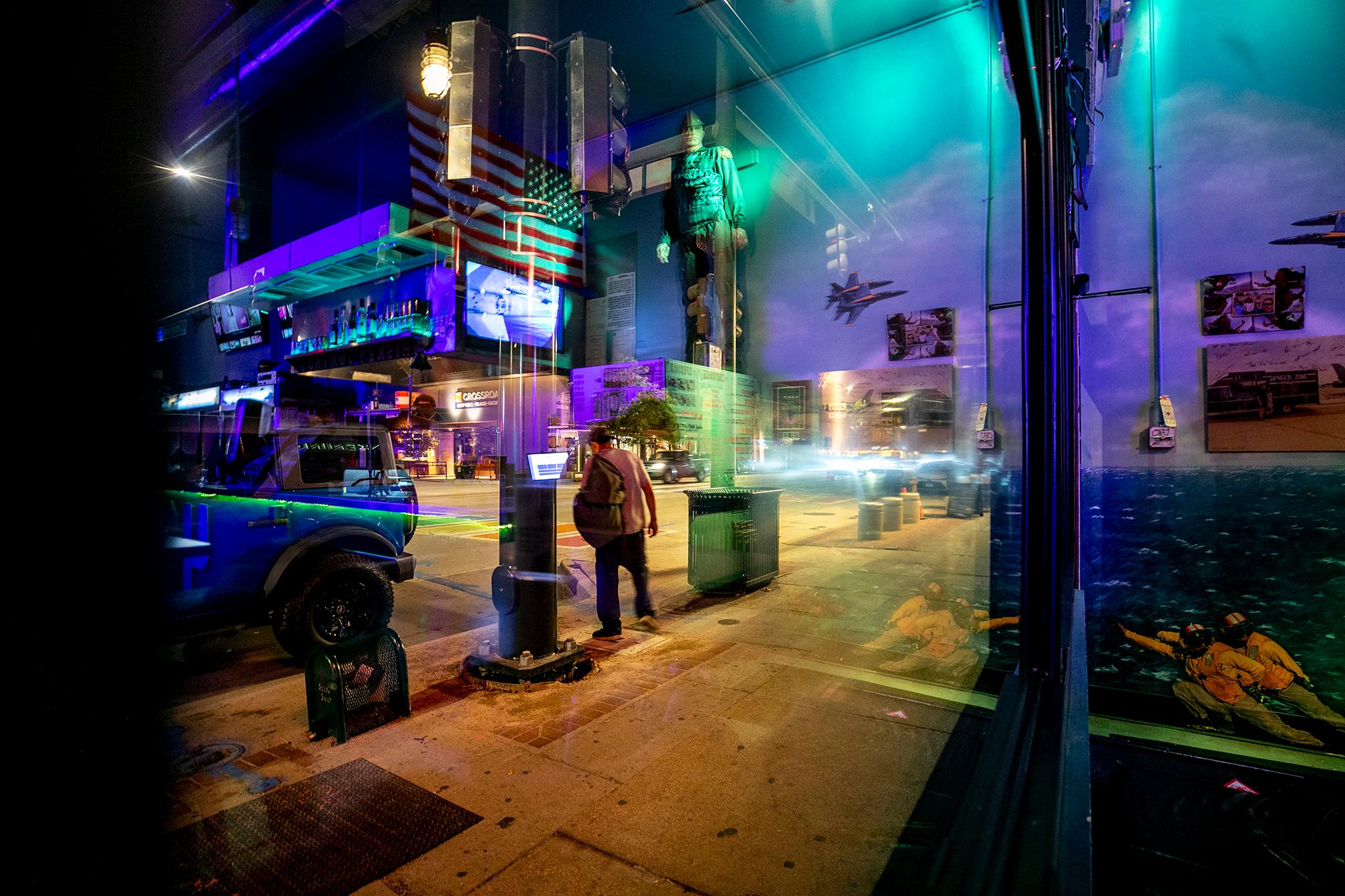
To pay Todd's landlord, who charges around $5,000 in monthly rent for the 14-by-40-foot restaurant, the owner needs to sell 500 calzones.
"We are so lucky that people love calzones," he says. "I can't imagine owning a coffee shop or a bad pizza place. The rent is out of control, and for some reason, nobody's pointing the finger at greedy landlords."
Saturday night, workers from the nearby ice cream shop Sweet Action walk into the restaurant and order drinks.
Satchel Tolmich's family has been in Colorado since the state was part of Mexico. He grew up in Denver's punk scene and used to leave his home in Five Points to hang out on Broadway.
After high school, Tolmich moved to San Francisco, where home prices are even higher than Denver. He decided to return for his family's support.
"I knew I would still be broke," he says. "But my whole family's out here. And all of my family comes from poverty. So there's this sense of never being ashamed of being broke."
While his family expects him to try to pay his bills, they lend a hand when needed, he says. "They're like, "Mijo, don't worry. I don't want you to stress about these things. We will help you with these things. Do what we never got to do, which is, like, actually be happy."
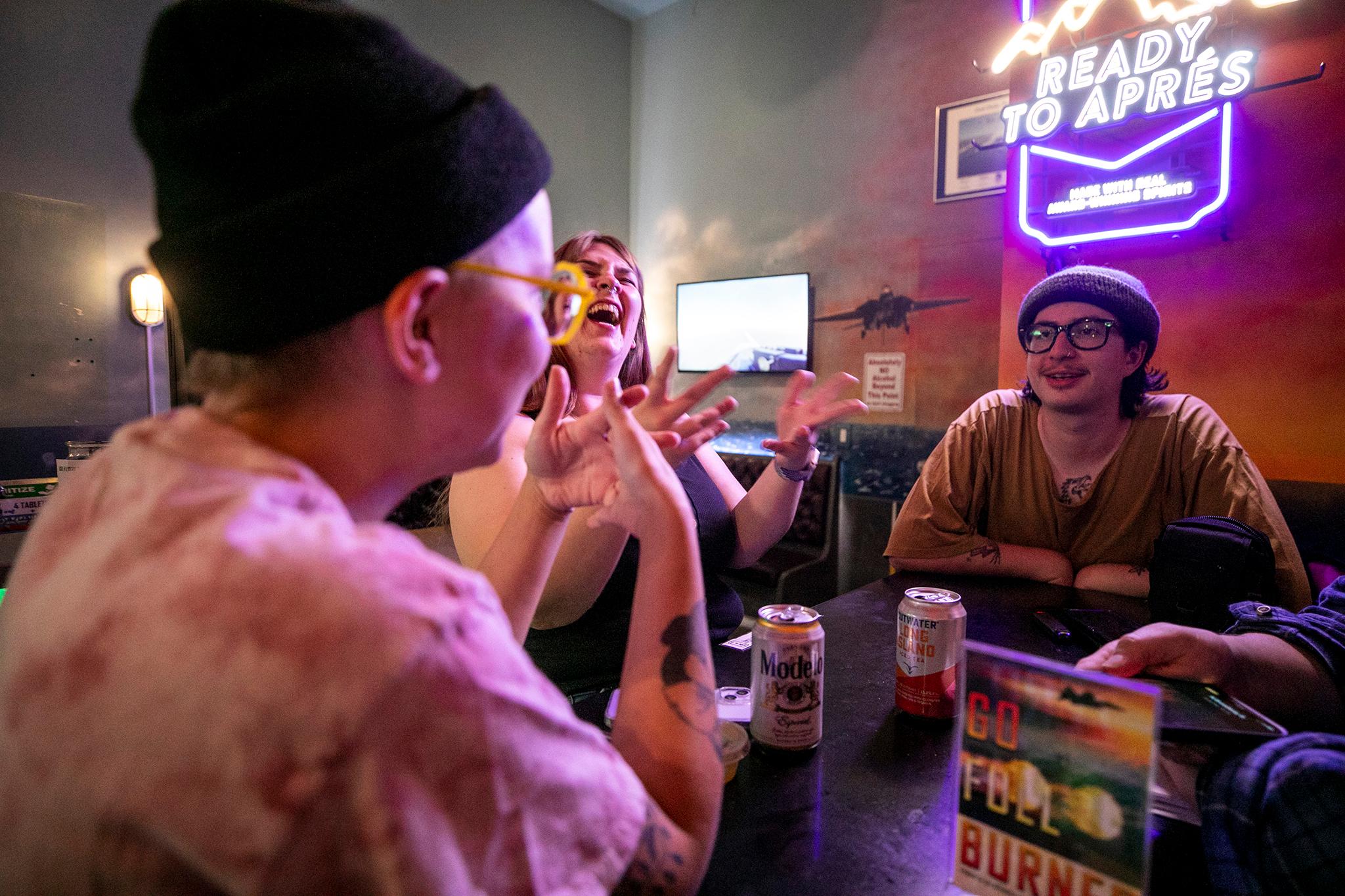
Their boss, Mily Wendland, moved from New York two years ago during the pandemic. They live with their partner and work at Sweet Action and the South Broadway coffee shop Bardo. With two jobs, a few more dollars an hour than their coworkers make, and split rent, Wendland's able to make it work in the Baker neighborhood and loves it. Still, they have to use EBT cards, or food stamps, to pay for food.
Jessica Holtje, who just moved to Denver from Tulsa, Oklahoma, says she views the city as a safe haven from conservative culture war politics that have swept the South -- particularly after Roe vs. Wade was overturned.
"In the South, it's a lot," she says, "especially for someone who is queer-minded. You feel ostracized. You feel alone."
Denver, on the other hand, has given Holtje a sense of freedom. "It's refreshing," she says -- even if it's expensive. She grew up in poverty in Oklahoma, and even though she's making more here than she did there, she's still struggling. The black-mold infested apartment she rents near the Denver Tech Center is too expensive.
"If I'm going to be poor, I'm going to be poor in Denver," she says. "I'm going to be poor anywhere else other than Tulsa, Oklahoma."
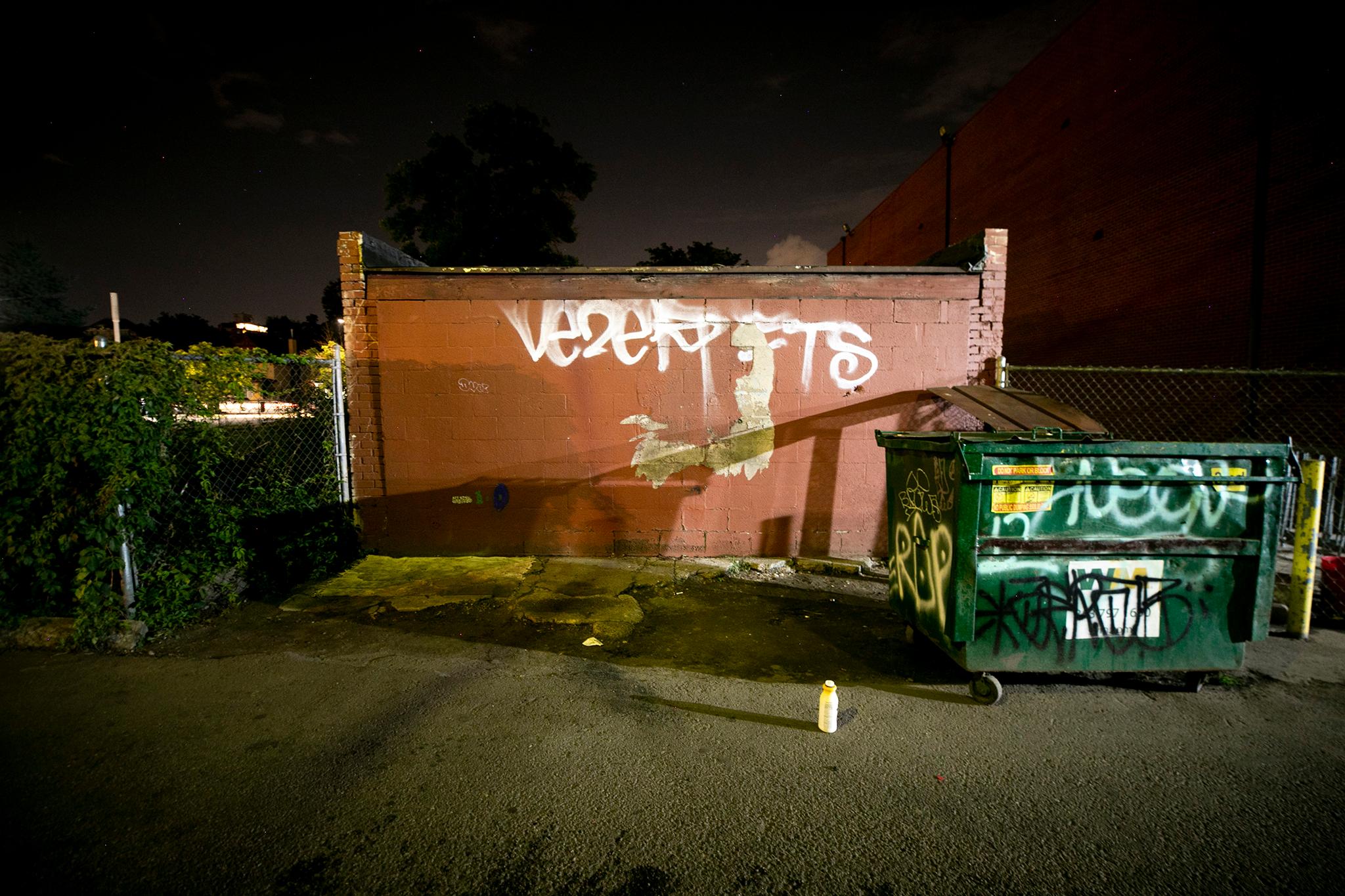
On Saturday night, the alley where Gregory Down had splayed out his belongings is now clean, and he's gone. Kai Cooper poses near the dumpster.
"I'd seen this dope alley," he says. "I got my camera so I wanted to do it little TikTok real quick, you know?"
Cooper has been producing alternative punk music for six years under the name 1K CXXPE -- pronounced One Kay Coop. While he's made some money with his music, it's hardly enough to pay the bills -- or even for studio time.
"It's expensive out here," he says. He lives in a one-bedroom apartment. "It's very expensive. I live on my own. I need two jobs, at least. I have a girlfriend, so she helps me cover half."
When Cooper's not making music, he works security jobs downtown, driving the 16th Street Mall.
"There's so many times I catch somebody homeless," he recalls. "They're almost dying. And I have to Narcan them and bring them back to life."
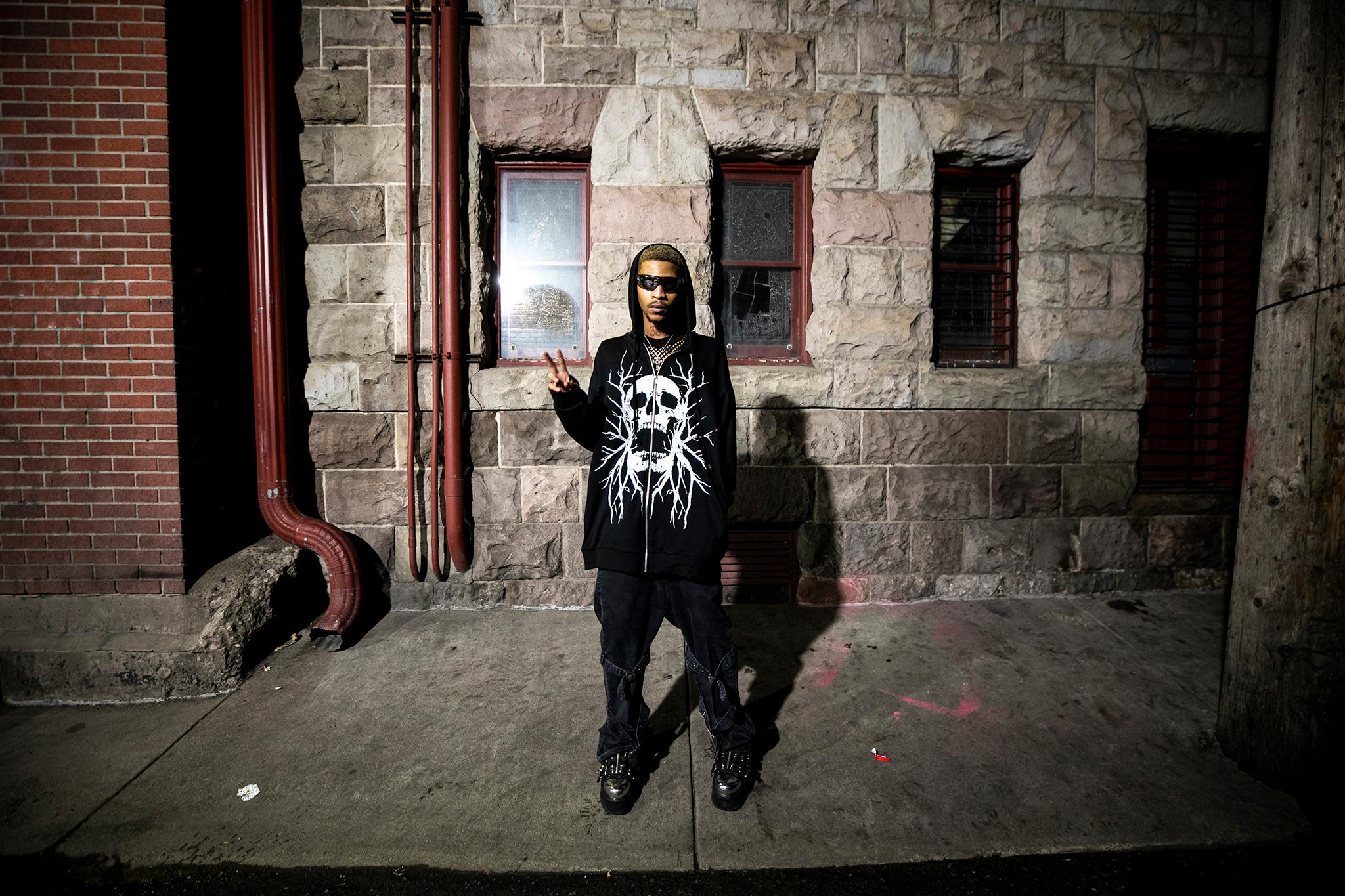
Two hollow-eyed young men, Kaleb Cormier and Pat Sheahan, sit huddled in a doorway, with a sign asking for money, as bar crawlers walk by, mostly ignoring them.
A few years back, Cormier moved from New Orleans to Denver looking for a new place to live. They've been without a home for roughly three years.
"I feel like people here are very nice," says Cormier. "Some of the homeless people put on a bad impression. A lot of people out here are mostly drug users. It kind of makes us look bad and everything, but everybody here is very nice."
Neither man is aware of gang stalkers or others attacking unhoused residents. Nor have they heard of Mayor Johnston's homeless state of emergency.
"I don't really have a phone or anything, so I don't really keep up with that," says Sheahan.
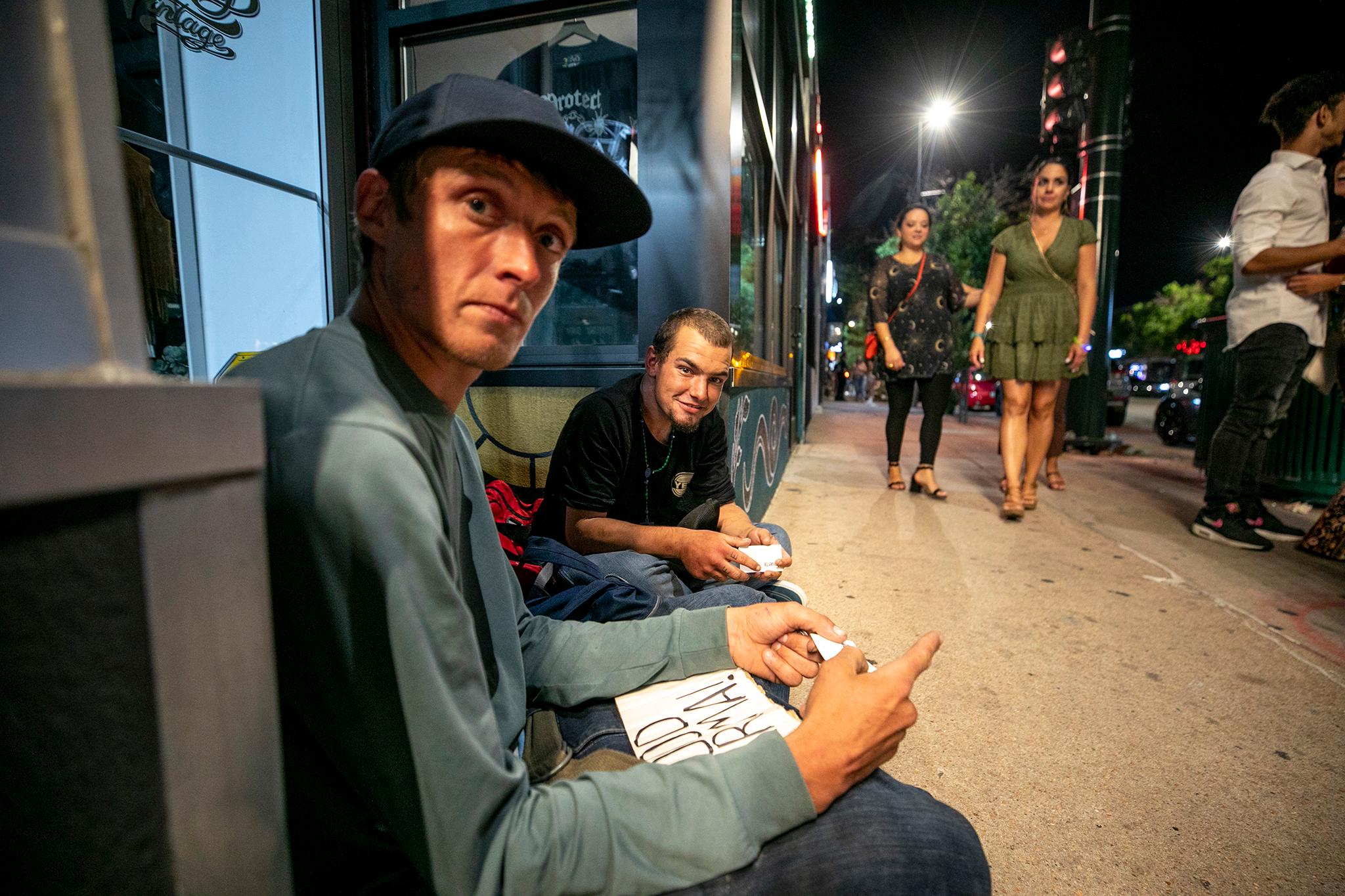
Both men have steered clear of the encampments, where Johnston is focusing his housing efforts.
"We stay away from all that," Sheahan says. "We stick to ourselves."
When they have had run-ins with police, it's largely been a good experience.
"The cops here are really friendly," adds Cormier. "If you ask them for help, they will help you."
And though they have no immediate plans to get off the street, they have hope.
"No matter what you do in life, just keep your head up and keep striving for the best," says Cormier, "because one day it's going to come."
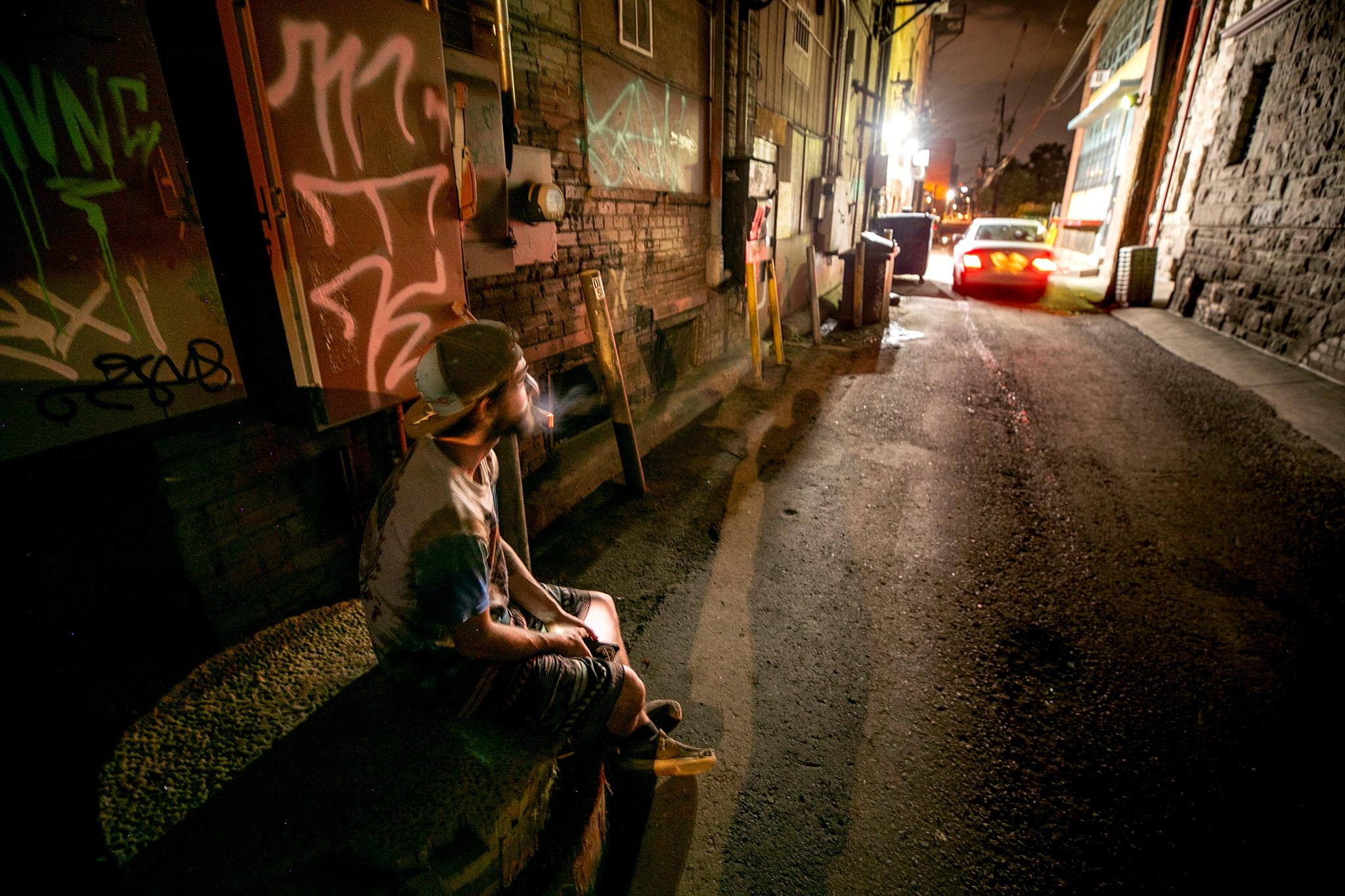
As the bars close, drunk patrons trickle into the calzone shop. Stetson Newkirk takes a smoke break from the late shift.
He's no stranger to homelessness. As a kid, growing up in a small town in Oklahoma with 66 people in his graduating class, he and his mom lived out of their car and in motel rooms. As an adult, he's been on the brink of losing his housing, too.
He shares an apartment with his ex-girlfriend of five months. Finding a new place has been a challenge and splitting the rent keeps things affordable.
He recently went on a date with a woman who had been homeless. They walked up and down Broadway, and she knew many of the unsheltered people living on the streets.
"Living in the city has made me a little more cynical about the subject," he says. "I try to give everyone the moment I meet them all my trust. But I guess from the moment I meet them, there's a chance I could lose it too. But when you have that openness, usually things turn out better. I try to do that with everyone. But then some people are just a*******. Some people are just out of it. "
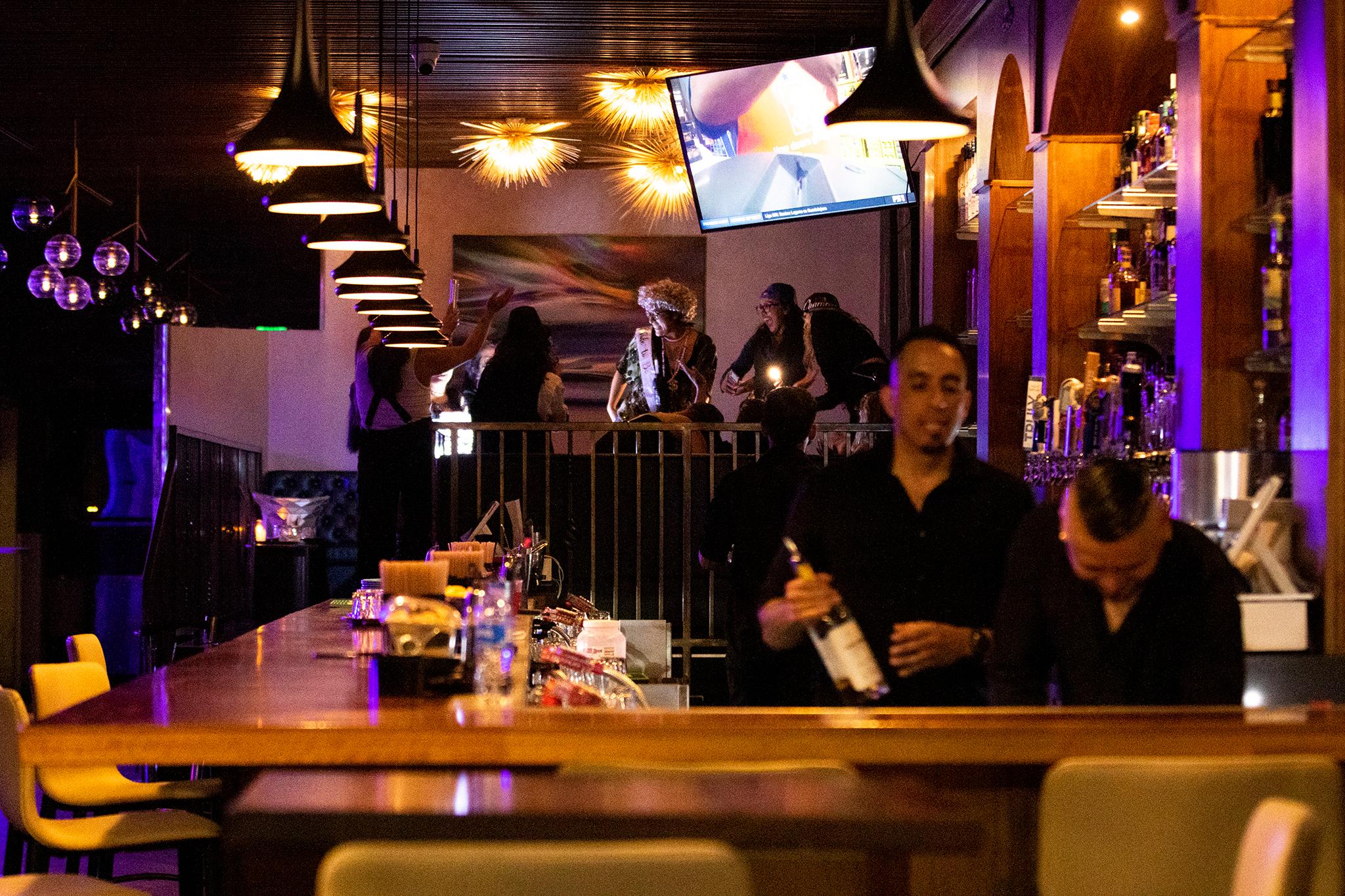
Around 3 a.m., Broadway has emptied out.
Wilt smokes one last cigarette before closing for the night.
He's looking forward to the future and points toward the now-shuttered Casey Jones Pizza a few doors down. He says the calzone shop's co-owners, Todd and Schefter, are in talks with the landlord about renting out the space to open a new restaurant.
Wilt has already walked through the vacant restaurant and eyed its $160,000 pizza oven. He's eager to start cooking on it -- assuming the deal goes through.
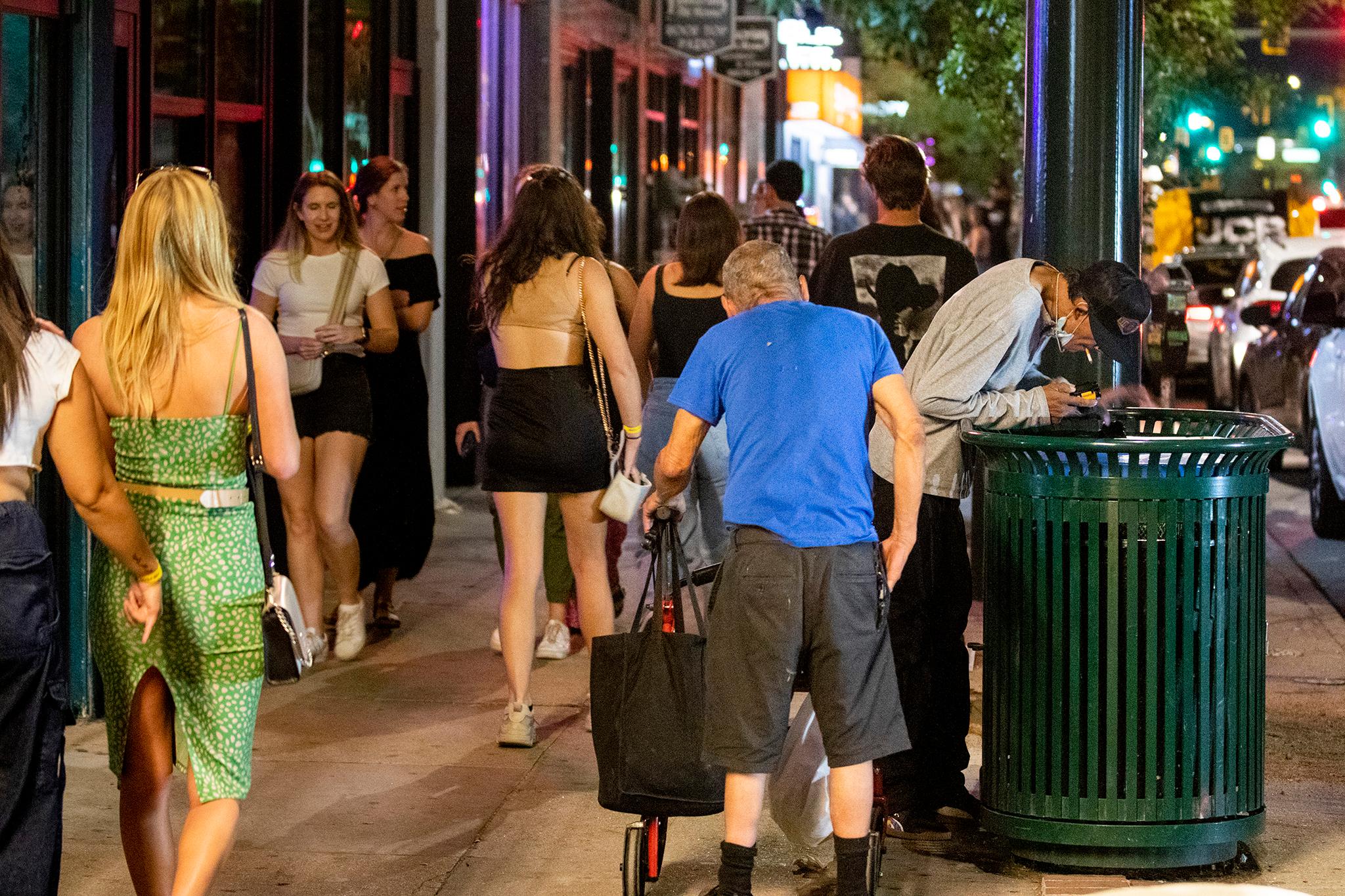
"They offered me to make the menu for it," Wilt says. "They want to give me every Wednesday at their restaurant to be my food, so it will be Wayne's Wild Wednesdays."
Wilt takes pride in his relationships with customers, and he's just as friendly with some of his neighbors living on the street. Earlier in the night, a man who had lived in a doorway down the block before finding housing asked for water. Wilt handed him a free bottle and gave him a hug.
"You know we've got you," Wilt told the man.
Though Wilt has been attacked, robbed and threatened and isn't afraid to be confrontational, he's trying to make peace with all his neighbors.
"We have our bad moments, and we have our good moments," he says. "I've been giving away free calzones so I don't get any more bricks thrown at me."
